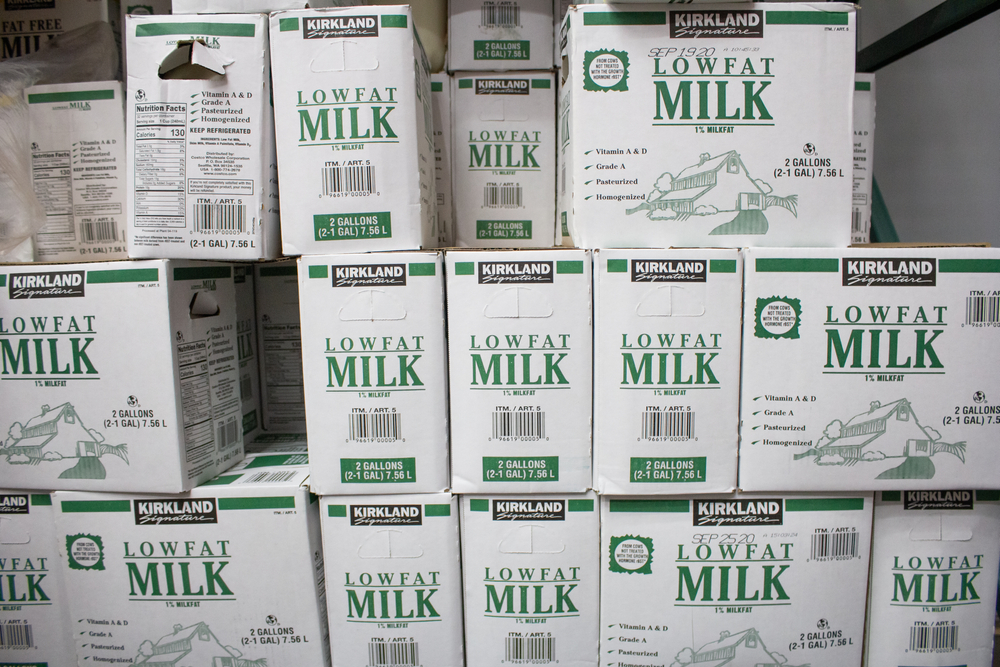![]() When it comes to dairy products do you tend to buy full-fat or low-fat products? For many people, going for low-fat options can seem like the “healthier” choice.
When it comes to dairy products do you tend to buy full-fat or low-fat products? For many people, going for low-fat options can seem like the “healthier” choice.
Indeed, a 2020 survey in the US found that out of 1,000 people questioned, one in three sought out “low fat” or “reduced fat” foods or drinks, with dairy being the most common food category for low–fat options. But is low-fat milk, cheese, yoghurt and butter really any better for us?
Many governments and public health bodies recommend dairy as a key part of a healthy diet (although it’s perfectly possible to be healthy without it, as many people around the world are). And many people opt for low-fat options as part of this.
Low-fat milk is made by removing or skimming the cream off the milk. So you can get whole or full-fat milk (3.5% fat), semi-skimmed or half-fat milk (1.8% fat) or fully skimmed milk (0.1%-0.3% fat).
The same process can be used to make lower-fat cheeses and yoghurts. However, removing fat can affect how cheese dries and how flavours develop during maturing.
Most relevant dietary guidelines encourage the consumption of low-fat dairy foods, except for in very young children. But a recent review of the available research found that children who consumed full-fat dairy foods were healthier and leaner than those who consumed reduced-fat versions.
It could be that families who tend to have a history of living with health issues relating to diet or higher body weight may be more likely to eat low-fat products. An alternative view is that full-fat dairy products might be more filling and help with the regulation of appetite, meaning people eat less overall.
Either way, these observations in children have also been seen in adults.
Explaining the science
It’s not just that low-fat dairy foods may not be better for our health. There is increasing evidence that some of the fatty acids found in dairy fats might actually reduce our risk of developing heart disease and type 2 diabetes.
Indeed, it seems that higher intakes of fermented dairy products like unsweetened full-fat yoghurt and some cheeses might be associated with lower risks of heart disease and type 2 diabetes.

Could low-fat be worse for you than whole milk?
Image credit: The Image Party/Shutterstock.com
When it comes to the recommendation to eat reduced-fat dairy foods, the Australian guidelines seem to be based on a mathematical decision around how calories add up to meet the recommended calorie intake for an average adult.
It’s unclear if this is the same for the guidelines in other countries, as elsewhere the detailed evidence has not been published in the same way. But it may well be that other recommendations to use lower-fat dairy products are based more on maths than science.
It’s also worth noting that the potential health benefits linked to dairy foods do not extend to butter and possibly not milk either, but are largely linked to intakes of yoghurt and some types of cheese.
There’s also a myth that low-fat milk and cheese can lead to weight gain, but this is false. It appears to be based on historical farming practices that used leftover skimmed milk from making cream to fatten piglets.
Low-fat v full-fat
So, given the minimal evidence, why do so many healthy eating guidelines – including in the UK, US and Australia – recommend that we choose low-fat or reduced-fat versions of dairy products?
Research has found that higher intakes of saturated fatty acids are linked to an increased risk of heart disease, type 2 diabetes and dementia.
But this research looks at saturated fatty acids in general and not specifically saturated fatty acids found in dairy products, which have been shown in both children and adults to be potentially beneficial for our health. This is thought to be to do with the way these foods are fermented.
So these recommendations may come as part of suggestions to limit overall fat intake more broadly, rather than because full-fat dairy is “bad” for us.
Switching from full-fat milk to semi-skimmed milk in tea (up to five cups a day) is likely to save the average person less than 50kcal per day. This means, even when considering calories and energy, the effect of reducing fat is minimal.
So if you consume dairy products, it’s likely that there’s no need to worry too much about the fat content. This is especially the case when it comes to unsweetened yoghurt and cheese, which when consumed in their full-fat form do seem to come with potential health benefits.![]()
Duane Mellor, Lead for Evidence-Based Medicine and Nutrition, Aston Medical School, Aston University
This article is republished from The Conversation under a Creative Commons license. Read the original article.
Source Link: Full-Fat Or Low-Fat Cheese And Milk? A Dietitian On Which Is Better